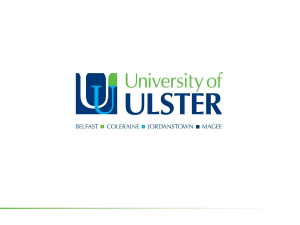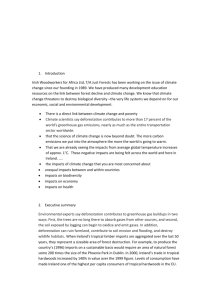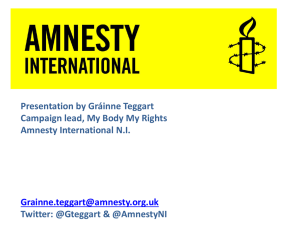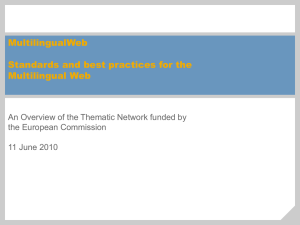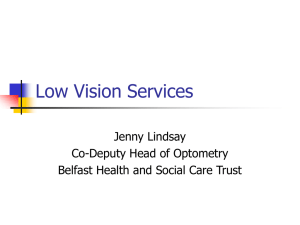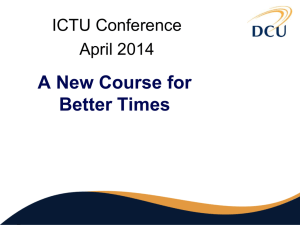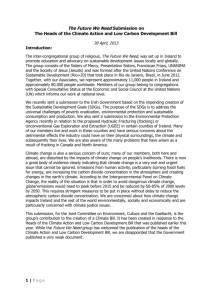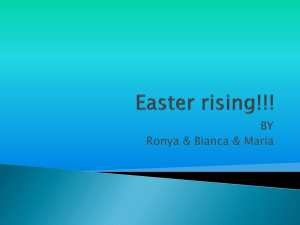EPA Presentation 21 May
advertisement
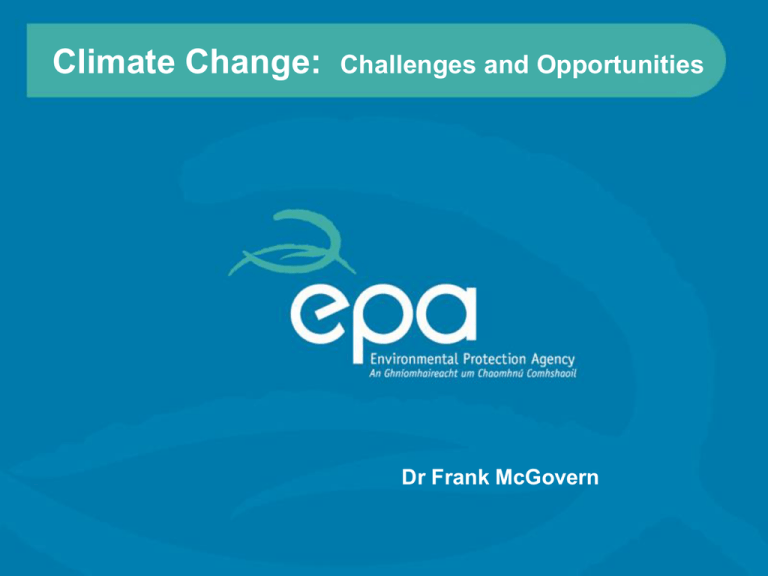
Climate Change: Challenges and Opportunities Dr Frank McGovern EPA roles on Climate Change The provision of annual reports of Ireland’s greenhouse gas emissions by sector and removals by sinks; National projections of emissions based on national and European policies and measures; Implementation of the EU Emissions Trading Scheme and other market mechanisms; The co-ordination and development of climate change research; Provision of scientific and technical input and advice to the Department of Environment, Community and Local Government, other Government Departments and State agencies; Informing policymakers, stakeholders and the public on environmental issues and solutions, and promoting good environmental practices; Engagement with EU and UN bodies dealing with climate change; Key messages on climate change • Climate change is real and poses a global and local threat for social, cultural and economic development and it will radically change Ireland’s environment and economy • Global actions are need to address the drivers of climate change and Ireland has to play its part • A transition to a low carbon, climate resilient economy is essential for Ireland and there are many benefits and opportunities in doing this • The policy development process needs to act now to address the challenge of meeting our 2020 emissions targets • A positive, environmentally sustainable Vision for Ireland is needed, that is underpinned by effective policies and measures, a dynamic implementation process, and robust monitoring, reporting and verification systems The Science 1850s Carlow born scientist John Tyndall worked out why the Earth is not a cold barren rock like Mars or the Moon The reasons include gases like carbon dioxide which trap energy and keep the Earth warm, these are now called greenhouse gases (GHG) The more GHGs in the atmosphere, the more energy is trapped and this potentially changes everything we have taken for granted about our environment and our climate Ice melts, oceans warm up, sea level rises, and weather patterns change, coastal land floods, storms and rainfall become more intense, drought are prolonged, heat wave are hotter and ecosystems change or disappear But it’s a complex world and Ireland need to be prepared to meet the adaptation challenges including dealing with extremes Global temperature records show that long term trend Ranked data show the 1st decade of the 21st Century has been warmest on record. Source: WMO statement on the status of the Global climate in 2012 The Challenge Excess Carbon Dioxide in the atmosphere is recognised as the main driver of climate change but there are other important players. Carbon Dioxide There are two main sources of excess carbon dioxide 1. Fossil fuel use 2. Land use change and poor management of land and biomass The other players include Methane, Nitrous Oxide and Industrial gases are also important Their sources include, food production and a range of industrial processes The challenge is to Break the link between energy and fossil carbon Ensure that food production and land use sustainable Don’t allow the release powerful industrial GHGs into the atmosphere Observed GHG Emissions and Emission Scenarios Globally Emissions are heading to a “likely” 4.0-6.1ºC increase in temperature Large and sustained mitigation is required to keep below 2ºC Source: Peters et al. 2012a; Global Carbon Project 2012; The Immediate Challenge for Ireland Additional measures are urgently required for Ireland to achieve its 2020 emissions targets The Opportunities There are major win-wins for society, the environment and the economy High GHG emissions are an indicator of poor management and sub-optimal performance, The more GHGs you produce the less efficient and less profitable you are in your business, your farm, or your home Globally non-fossil energy sources can address energy needs Ireland has major renewable potentials including wind, solar, and biomass Ireland’s agricultural system is efficient but can be better Good management of land, live-stock and resources is essential Sustainable management and improved resource use can increase returns Targeted innovation, learning and research is essential at all levels and across Government to enable the required low carbon transition Vision: Ireland can be a global leader in sustainability. Conclusion Climate change is real and poses a global and local threat for social, cultural and economic development and it will radically change Ireland’s environment and economy Global actions are need to address the drivers of climate change and Ireland has to play its part A transition to a low carbon, climate resilient economy is essential for Ireland and there are many benefits and opportunities in doing this The policy development process needs to act now to address the challenge of meeting our 2020 emissions targets A positive, environmentally sustainable Vision for Ireland is needed, that is underpinned by effective policies and measures, a dynamic implementation process, and robust monitoring, reporting and verification systems

